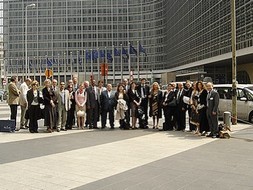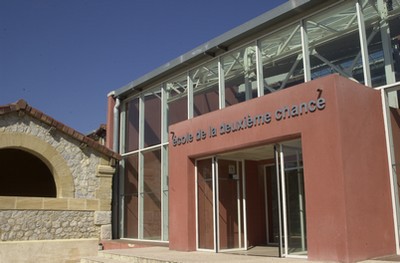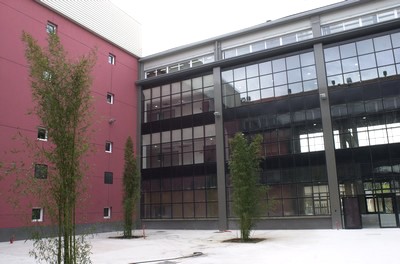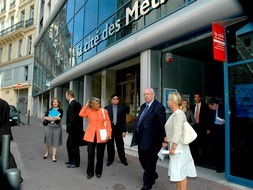Marseilles was selected in 2006 as Lead City in implementing the “Euro-Mediterranean Coastal Planning Projects” (PACEM).
The project, designed over 36 months, started on 15 January 2007. It benefits from a European subsidy of EUR 620 000 and unites, around Marseilles, the cities of Rabat (Morocco), Gdansk, (Poland) and the Urban Community of Al-Fayhaa (Lebanon).
The first aim is to strengthen cooperation between consortium partners by building upon specific projects, within the framework of lasting local development of the MEDA-city coastline (Lebanon, Libya, Syria, Jordan, Egypt, Palestinian Territories, Israel, Tunisia, Algeria, Morocco).
Marseille Mission Europe draws upon the technical expertise of City of Marseilles agencies and has also brought in a number of partners: the Euro-Mediterranean Public Establishment, the French Bureau for the Seas, the Rhône Méditerranée Corsica Water Agency, ONIDO and the Anima Network. The aim is to promote urban modernisation by: creating activity, conserving the environment, promote heritage and develop tourism.
An opening conference, under the aegis of the City of Marseille and attended by partners in Morocco, Lebanon and Poland, was held in Marseilles from 22 to 25 January 2007.
On 12-13 March 2007, the European Commission inaugurated the MED-PACT Programme by inviting all of the project owners selected for the initiative to Brussels. The event offered them the opportunity to meet with the European leaders in charge of the said programme, as well as make contact with the Mediterranean leaders responsible for other projects. Right in line with the timeline set out for PACEM, the first diagnostic missions were carried out, on site, in Southern partner countries.
1st Mission in Rabat in 2007
During the first diagnostic mission, which took place in Rabat from 20-23 March, various aspects of coastal engineering and sustainable development were largely explored.
This first contact made it possible to identify information and share experiences on-site. The mission offered the opportunity for on-site visits, interviews with various municipal, association-based or political managers and document collection, with the significant cooperation of our partners in the project and, in particular, the international task force to the municipality of Rabat.
The following week, a Marseilles-based delegation went to Tripoli (Lebanon).
1st Review by the European Commission
On 20 June, a meeting was held with the European Commission review officer for the MED-PACT Programme, as part of the technical assistance mission to project owners.
2nd mission, in Rabat, November 2007
Representatives from DGUH, DGST, MME, the Water Agency and the Bureau for the Seas went to Rabat (co-leader and partner) to finalise the diagnostic statement and prepare the training seminar. The mission was also an opportunity to bring in a new partner and associate to the City of Rabat, with the Mohammed VI Foundation for the Protection of the Environment.
3rd Mission, in Rabat, in January 2008
Annual meeting in Marseilles and co-leader with the Representation of the European Commission, for a progress report on the project
PACEM Project Web site
The period just completed saw website construction continue; this is currently being completed.
Reviews
Marseille produced a 2007 Activity Report and Financial Review. The Auditor certified the accounts put forth by the City of Marseilles for the first year of the project.
2nd Steering Committee Meeting
The project’s partners met for the second Steering Committee, held in Gdansk in April 2008. The Technical Monitoring Group meeting immediately thereafter was used to schedule the activities to be carried out in 2008.
Meeting in Brussels in 2008
The 9 MED-PACT programme leaders met in Brussels for a meeting and mid-way programme review.
New Partner
After the Egyptian partner dropped out, Marseilles sought out a new MEDA partner to join the consortium. Discussions with the City of Akaba (Jordan), which borders the Red Sea, appear to have made good headway.
21 – 25 July Diagnostic Mission in Tripoli
The mission initially scheduled for late-June was postponed from 21 to 25 July 2008. It was used to finalise the diagnostic statement and specifications on the study to be carried out. The delegation was composed of Marseille Mission Europe, the Shared Quality of Living Authority, Technical Services Authority and the Bureau for the Seas.
4 - 5 August Training Session
Marseille held a training seminar dedicated to "Beach Management", steered by the Water Activities and Beaches Authority, with the presence of technicians from Gdansk and Tripoli.
30/11 – 3/12 2008 Training Seminar
The City of Rabat is holding a training seminar dedicated to land planning and protection for beaches. Technicians from the cities of Gdansk, Marseilles and Tripoli will participate.
On this occasion, the City of Marseilles will donate ten drifters and one safety boat.
MED PACT website
PACEM website
Interreg III B
By optimising the economic benefits that come with achieving critical mass, through greater cooperation between cities and regions, the Interreg IIIB Programmes are a source of opportunity for the Mediterranean. Marseilles has been involved in three programmes since 2002, each endowed with an average of EUR 2M and 50%- subsidised by ERDF.
“Tela di Aracne” mobilised some 15 partners to facilitate female entrepreneurs in the textile industry in the Mediterranean (Spain, Italy, France, Greece, Morocco and Tunisia). Marseille Mission Europe has promoted the international role of Institut Mode Méditerranée, the Marseille Provence CCI and the local ConERDFation of Apparel Manufacturers by creating a single “go-to point” for fashion designers wishing to export.
“Marimed” approached fisheries as a driver for developing sustainable tourism in Spain, France and Italy. This initiative enabled such concrete outcomes as the development of a fish farm or the creation of international seminars on fisheries.
“C2M” served as the driver for cooperation in southern Europe, with the creation of a platform between major partner metropolises.
For more information
European Commission website
MARIMED website
Project partners
 Key facts and figures
Key facts and figures
Figures
2001 to 2006: The "Action" Years
Over these six years, relations between Marseilles and Europe changed the face of the city.
- The most visible change: 17 major infrastructures were built, with EUR 13.6 M in funding, secured by Marseilles Mission Europe, under the European Union’s regional policy. This figure accounts for nearly one-fourth of the budget needed to build Cité des métiers, the Belle de Mai Media Hub or the Château Gombert Technological Hall.
- The most promising: Marseille was chosen by the European Commission to carry out ten cooperation projects across the world, often as lead party. Our city secured over EUR 6M in Community programme funding for action on urban management, healthcare, the environment, urban planning and social action.
Dates
Marseille, over 20 years of European history
Ten years before the Barcelona Process was instituted, Marseilles was already opening up Euro-Mediterranean dialogue, to develop economic, political and cultural exchanges between the two sides of the Mediterranean.
- 1985
In Marseille, the European Commission opens its only representation office in the French provinces, and the Mediterranean Integrated Programmes (PIM) are founded – the first Euro-Mediterranean cooperation initiative - 1993
The City of Marseilles creates a municipal structure dedicated to European Affairs and receives its first European funding under the Urban Pilot Project. - 1997
Marseilles inaugurates the first “New Start School”, Ecole de la deuxième chance, in Europe. This example was followed, in Europe, by the creation of 12 other schools. - 1998
Marseilles becomes the headquarters to Femise, network grouping over 70 independent economic institutes from 27 Euro-Mediterranean countries responsible for economic analysis of the Barcelona Process. - 2000
Marseilles becomes home to the only Regional Information Bureau at the European Parliament and hosts the Fourth Euro-Mediterranean Conference of Ministers of Foreign Affairs. - 2004
Marseilles hosts the European Investment Bank (EIB) conference dedicated to sustainable investment in the Mediterranean. - 2005
Several high-profile international meetings are held in Marseilles: les Rendez-vous de la Méditerranée, the Euro-Mediterranean Media Colloquium and the Euro-Mediterranean Investment Summit. - 2006
On Thursday 9 November 2006, the City of Marseilles is unanimously voted President of the Euromed Network of Cities.
Two Vice-Presidencies are also granted:
One to the City of Fez in Morocco, and the other to the City of Jdeidé in Lebanon. - 2007
Marseilles, Economic Capital of the Mediterranean
From 19 to 24 November 2007
The City of Marseilles and Provence – Alpes – Côte d’Azur Region organised, with the Euro-Mediterranean Public Development Establishment, the first “Mediterranean Economic Week”. Through fourteen large-scale events, economists, experts, entrepreneurs, elected officials and local and national public leaders from different countries were able to broach the major issues conditioning the consolidation of the Mediterranean partnership and regional economic integration - 2008 : French Presidency of the European Union
Marseille plays host to many major events
1 – 2 July The Anima network launches the Invest in Med programme. It is a new European project, aimed at fostering, from Marseilles, investments in the Mediterranean Basin.
2 - July First Ministerial Meeting organised by the French Presidency of the Council of the European Union. The Euromed Commerce Conference brought together 27 EU Ministers in Marseilles and 13 Mediterranean partners.
3 – 4 July This Ministerial conference was followed by the "Med Business Days" meeting on the topic “Enterprises, driving the Mediterranean”.
Med'act and Medpact
Quality of Living and Sustainable Development around the Mediterranean. Cities can act as a driving force in cooperation between the two banks of the Mediterranean, in order to promote a place of peace, stability and prosperity. Marseilles has been involved in two programmes, establishing lasting cooperation, built on expertise-sharing and training:
>MED'ACT
This project, aimed at effectively managing the environment and improving quality of living in urban areas, was carried out over a 12-month period, in 2004 and 2005, in partnership with the cities of Genoa (Italy), Side Abdullah (Algeria) and Amioun (Lebanon). Endowed with EUR 470 000 in European subsidies, it has enabled Marseilles to confirm its policy of openness to the Mediterranean Basin.
MED-PACT
Marseilles, as project leader, was chosen by the European Commission in 2006, as part of a coastal engineering and sustainable development cooperation project in the Mediterranean with its partners: Gdansk (Poland), Rabat (Morocco), Alexandria (Egypt) and the Urban Community of Al-Fayhaa (Lebanon). Marseille Mission Europe has set up a creative partnership between these cities hailing from different cultures and secured EUR 620 000 in European subsidies.
 Regional Policy 2007-2013
Regional Policy 2007-2013
Sustainable growth: the importance of cities recognised thanks to Regional Policy 2007-2013
Faced with profound economic change, fallow land, urban sprawl and exclusion, Marseilles has long developed expertise in the field of social cohesion and environmental quality.
Today, it benefits from Europe’s recognition of cities as a driver for sustainable growth. In 2005, Europe decided to lay down new foundations for its competitiveness, improve its growth potential and productivity and strengthen its social cohesion.
Cities, in which over 60% of the European population is concentrated, are central to this new strategic approach, which is aimed at innovation, entrepreneurial spirit and economic growth.
Moreover, transnational territorial cooperation is being continued, in particular with the regions locate at the Union’s foreign borders.
During the 2007-2013 Budget Planning Period, the economic, social, environmental and labour policies will mutually strengthen one another. The Provence-Alpes-Côte d'Azur Region will benefit from a budget of over EUR 521M.
For more information
P.A.C.A Regional Prefecture website
Interministerial Delegation on Local Planning and Competitiveness website
Tacis
Taking Action Against AIDS in Russia The TACIS European Programmes have made it possible to lower the social cost of economic restructuring in the former Soviet Union. Marseilles Mission Europe has put forth a project aimed at improving prevention and control over HIV/AIDS in the Region of Saratov.
With a total budget of EUR 221 000, which is 80%-funded by Europe, this task force on high-risk groups began working in late-2003.
To better inform and improve screening and prevention, the following decisions were made:
- to share know-how and experience,
- to train social workers and provide material assistance with a view toward the long term,
- to assess opportunities for extending this type of experience in other regions of Russia.
The project was completed on 15 December 2005. It will, in addition to individual-level sharing, have enabled material improvements such as the acquisition of a minibus used to disseminate information on prevention to the population, the purchase and installation of condom dispensers and the implementation of appropriate communications tools.
FOR MORE INFORMATION
About the TACIS Program
 The Euromed Cities Network
The Euromed Cities Network
A network formed to actively involve European cities and those of the Southern and Eastern coastlines of the Mediterranean in the Euro-Mediterranean partnership initiated in 1995 by the European Commission, under the name “Barcelona Process”.
The fine print… The network met for the first time in December 2000, at the initiative of Bordeaux, which served the first presidency. In 2004, Turin took over from
Bordeaux, before passing the job on to Marseilles, in 2007. Since 2009, the city of Nice is president of the network.
During the presidency of Marseilles, action programme aimed to :
? Continuing and intensifying the Group’s relations with Community authorities,
? Broadening the partnership between European cities and MEDA cities,
? Sustaining the partnership through the action of other networks and organisations,
? Fostering project engineering and identifying funding to help cooperation programmes,
? Setting up experience-sharing and training initiatives between Euromed network cities.
For more information
CGLU
Euromed Parliamentary Assembly
The Mission's Role
It is with Europe that Marseilles is developing and confirming its role as an international metropolis and heading Euro-Mediterranean cooperation.
It is with Europe that Marseilles is developing and confirming its role as an international metropolis and heading Euro-Mediterranean cooperation.
To achieve its goals, the team at Marseille Mission Europe, working with the General Secretariat of the City, is taking advantage of the opportunities created by the European Union. Marseille Mission Europe is also actively involved in several development projects – economic, social, cultural and urban.
Marseille Mission Europe (MME) has four primary missions :
- To identify all possible funding for our city, under the European Union’s regional policy (Regional Policy 2007-2013, Career Resource Center, The New Start School et Belle de Mai Hub).. The said policy supports, through structural funds ERDF and ESF, action in favour of well-balanced economic and social development across all of the Union’s regions.
- To respond to European project bids through community programmes. These make it possible to share expertise, know-how and solutions in the economic, social and environmental fields with other cities across the world. MME works in particular with Mediterranean Basin partners.
-
- To represent Marseilles in the networks of European cities ( Eurocities, Marseilles and the euromed Network of Cities) through which major metropolises can work together on cooperation programmes and share their experiences. Marseilles actively positions itself in a number of these networks, to identify partnerships, put together projects or carry out lobbying initiatives with the European Commission.
- To assert the role of the Euro-Mediterranean metropolis by developing dialogue and cooperation between cities on both sides of the Mediterranean.
Bureau du Parlement européen à Marseille
Représentation régionale de la Commission européenne à Marseille
Parlement européen
Conseil de l'Union européenne
Commission européenne
Communiqués de presse europa
Comité des Régions de l'Union européenne
 The New Start School
The New Start School
Marseilles, a leader in educational experimentation
Marseilles is the first city in Europe to have created a “New Start School” to offer young people under age 18 who have dropped out of school and have no degree or qualification the opportunity to gain what they need to successfully enter the job market. One out of every 5 young people in Europe fit this description.
Innovative teaching methods
A forerunner to new developments in the field of public action, the Ecole de la deuxième chance pilot project came into being in 2001, established on the site that formerly housed the city’s meatpacking industry. Marseille Mission Europe secured a EUR 5.5 M subsidy to build, with the school, an attractive training offer: a flexible structure, in close partnership with the association community and the private sector, where IT is considered a top priority.
Results
Having opened its doors to over 500 students, Marseille’s Ecole de la deuxième change is the largest of a European network of 13 schools, which have attracted nearly 4 000 young people since their founding: 94% of the students have been able to receive grants int eh schools, giving them a real transition to the working world. The Marseilles school is now supported by all of the local authorities in the region.
For more information
Ecole de la deuxième chance website
Urb'al
Managing Latin Cities and Ports: A Step Toward Quality with URB'AL. As early as 1995, European programme URB’AL was pointing up urban issues. The objective here is to build a direct and strong partnership between cities in Europe and Latin America. Marseilles was chosen by the European Union to head up two operations in this effort:
"Amistad"
Marseilles organised cooperation with Viña del Mar (Chile), Seville (Spain), Querétaro (Mexico) and Trelew (Argentina) by drawing upon its experience through the Allô Mairie service, to develop a high-quality municipal agency with a budget of EUR 200 000.
"Transformation Strategy for Urban Port Sites"
Initiatives to reclaim the port areas near urban centres were at the centre of discussions between the cities of Marseilles, Balboa (Spain) and Montevideo (Uruguay), Rosario (Argentina) and Valparaiso (Chile). The programme amounted to EUR 350 000.
Marseille Mission Europe and its partners have found solutions to some common issues: review processes, transnational charters, guides on best practices and seminars were all used to pave the way toward modernising municipal practices.
>ONLINE
Download the Guide on Best Practices
Wide-View
The European Neighbourhood Policy
“We must help our neighbours in their economic and political reforms” The European Neighbourhood Policy (ENP) strengthens political, security-related, economic and cultural cooperation between the European Union and its new neighbours. From 2007 to 2013, its budget increased to EUR 12 billion, up by more than 30% over the previous endowment.
An opportunity for the Mediterranean ?
Born in 2002 in order to create a place of prosperity and stability at the European Union’s borders, the ENP was aimed at the new neighbours from the East. It was later extended to the countries in the South Mediterranean: Morocco, Algeria, Tunisia, Libya, Egypt, Israel, the Palestine Authority, Lebanon, Jordan and Syria.
From 2007 on, the Tacis and Meda programmes were made part of this “neighbourhood and partnership instrument”.
”The European Neighbourhood Policy has gotten off to a good start, but the Union can do far more. We need to address the challenge of promoting peace, stability and economic prosperity on our neighbours’ soil. The best way to achieve this remains to support their political and economic reforms”, explained Benita Ferrero Waldner, Member of the European Commission in charge of foreign relations and the European Neighbourhood Policy (December 2006).
Attractive incentives are offered to the En’s partners, with a focus on the fundamental aspects : interpersonal contact, commercial relations, stronger cooperation in the field of energy, migration and visas, and financial support. A new investment fund in favour of ENP will be created.
To learn more
DOWNLOAD
Standard ENP Presentation
Standard PEV presentation

 Belle de Mai Hub
Belle de Mai Hub Career Resource Center
Career Resource Center Key facts and figures
Key facts and figures Regional Policy 2007-2013
Regional Policy 2007-2013 The Euromed Cities Network
The Euromed Cities Network The New Start School
The New Start School